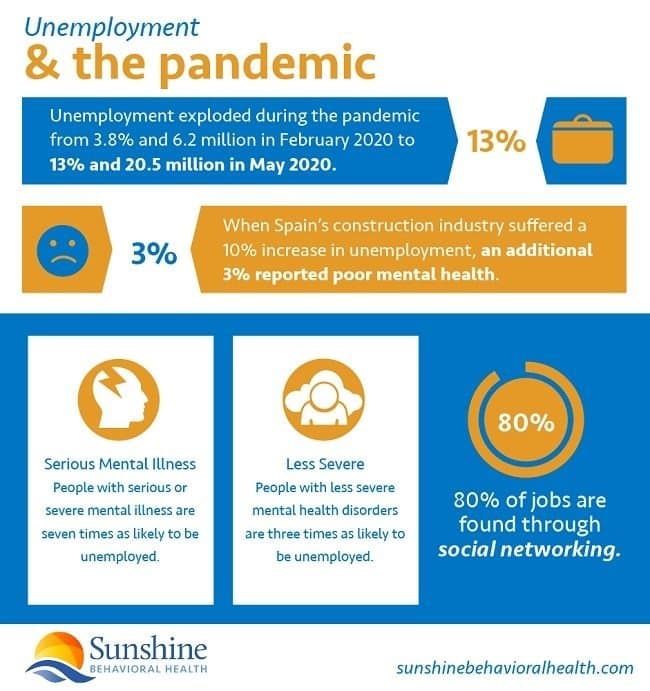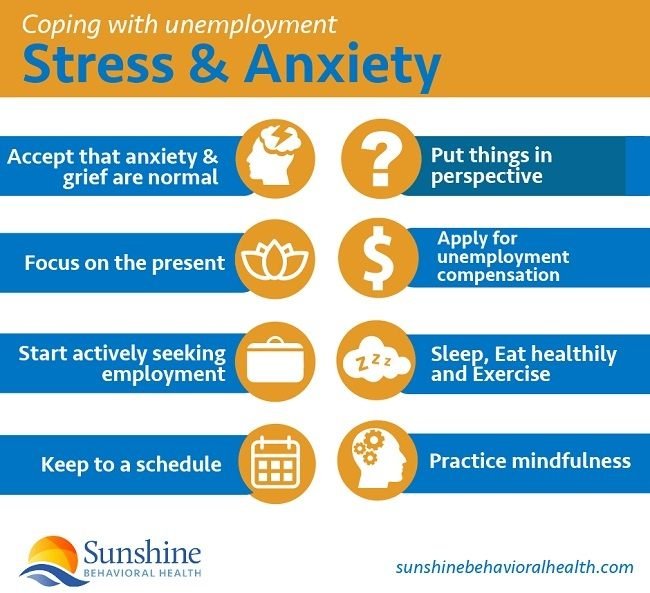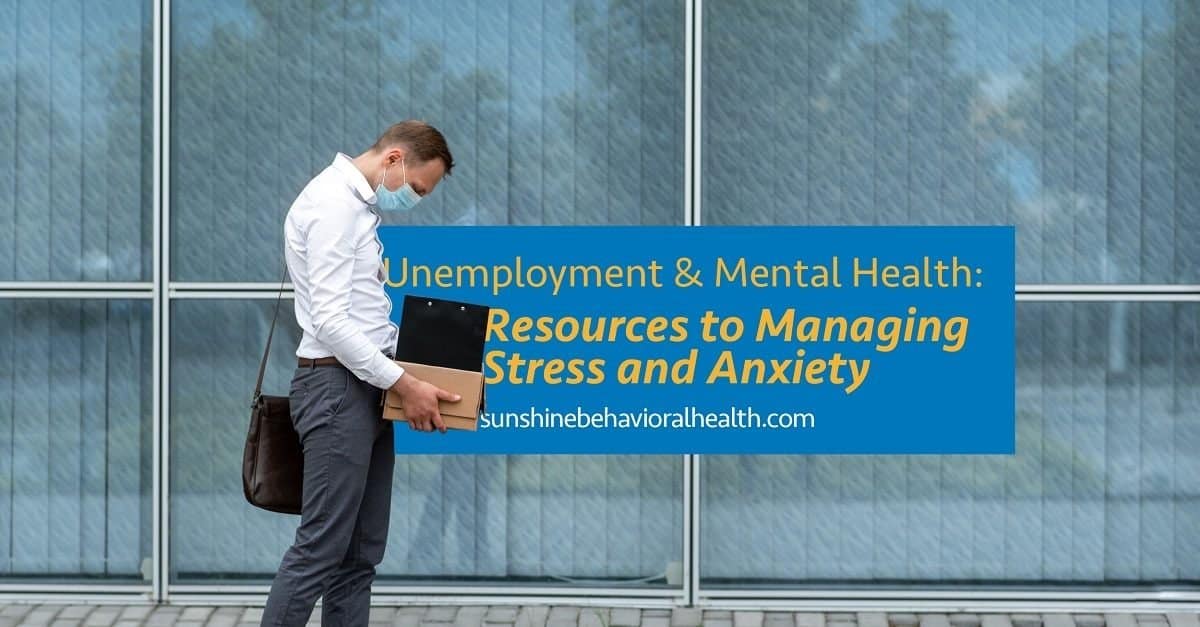The Rise of Unemployment
The rise in unemployment that followed the COVID-19 pandemic affects mental health as well as finances. It is a trigger for low self-esteem, trauma, and fear.
The number of people experiencing unemployment exploded during the pandemic, growing from 3.8% and 6.2 million in February 2020 to 13% and 20.5 million in May. That was already a drop from its peak in April (14.7% and 23.1 million), but in March 2021 it was still higher than the pre-pandemic rate at 6%.
At least one study predicts that following COVID-19, mental illness will be the next pandemic.
Even when individuals don’t like their current job, they prefer to be gainfully employed. There is a sense of security in being able to pay bills and enjoy other benefits of employment. People identify with their job. It’s who they are.
When unemployed, people may go through a range of emotions. A brief period of unemployment usually isn’t too worrisome. It can be a vacation or an opportunity to find a better or at least a different job.
When involuntary unemployment continues for a protracted amount of time, however, hope and anticipation may turn into anger, grief, and bitterness. The bills are piling up, unemployment compensation runs out or becomes harder to qualify for. The strain makes mental health issues more likely.
One study found that following a 10% increase in unemployment in Spain’s construction industry, an additional 3% reported poor mental health.
In general, people with serious mental health disorders are seven times as likely to be unemployed as the general public. Even people with less severe mental health disorders are three times as likely to be unemployed.

Effects of Unemployment on Mental Health
The inability to find gainful employment can have these increasingly negative effects on people over time:
- Loss of purpose. Many in society view the unemployed with prejudice, as if it were their fault, even in a pandemic. Working doesn’t just pay the bills. People want to feel useful or good for something. When individuals can’t find a job, they feel inadequate, useless, invisible, worthless.
- Depression. Losing a job also means losing intangible benefits of employment such as having somewhere to go, contact with co-workers, and social status. After as few as five weeks, one in 10 jobless Americans experiences depression, a sadness serious enough to interfere with their daily lives. After a year or more, the rate doubles to one in five.
- Insecurity. Without gainful employment, many people feel uncertain of their ability to provide for themselves and their families financially and insecure about themselves in general: their social worth or value. The longer this period of unemployment, the worse these feelings can become.
- Anxiety. It’s natural to experience some anxiety—feelings of fear or apprehension—as a response to stress, such as from being unemployed. It’s a way to cope and motivation to change the situation. When that anxiety is so severe or out of proportion that it prevents the individual from doing anything, it may indicate an anxiety disorder: social anxiety (afraid to meet people) or panic disorder (sudden attacks of impending doom, shortness of breath, or rapidly pounding heart).
- Irritability. Unemployment can make people snap at the little things (spilling milk, stubbing a toe) because they become more agitated, more easily upset, or frustrated. Such irritability may signify a more serious, developing mental health issue, maybe compounded by substance use disorder. Such co-occurrence is called dual diagnosis. Treatment for both disorders is necessary to help these individuals get back on the right track.
- Stress. Like anxiety and pain, stress is not necessarily bad. It is a survival mechanism that temporarily increases the body’s reaction time and ability to cope with an unusual or unexpected danger or situation. When that situation continues for an extended time, such as long-term unemployment, it puts a strain on the body and may cause harm.
Coping with Unemployment Stress and Anxiety
Unemployment can lead to many types of anxiety and stress. Here are some practical tips on how to cope with them.
Emotional
Anxiety due to unemployment can be hurtful and devastating. To cope with this type of anxiety, here are a few coping techniques that can make a difference:
Accept that anxiety and grief are normal. People who are unexpectedly and unhappily unemployed should feel anxious. That’s a biologically appropriate response intended to move them to action. If the individuals enjoyed their jobs beyond a paycheck, if they liked the people, duties, or tasks associated with them, then it’s okay to mourn that, too.
Put things in perspective. They shouldn’t take being unemployed personally. A lot of other people are in the same boat due to the pandemic. Instead, they should focus on what they do well, maybe better than anyone else, and if there might be another or better spot for them.
Focus on the present. Reflection is useful to prevent repeating a mistake, but no one should dwell on the past for its own sake. People shouldn’t waste energy obsessing about things that they cannot change. It’s better to think about what can be done now.
Socialize. Even in the age of social distancing, it remains important to interact with other people—both maintaining old friendships and making new ones—through video chat, phone calls, text messages. Studies show that this increased happiness leads to better health and helps them live a longer life. Besides, as much as 80% of jobs are found through social networking.
Financial
Aside from the psychological factors, there are practical financial pressures, too. From the onset, there are a few practical steps they can take:
- Apply for unemployment compensation. This should be done immediately to help alleviate any financial strain.
- Start actively seeking employment. This may include writing a new resume, developing an elevator pitch, and looking into side gigs such as ride-hailing or delivery services. Many state governments provide job search training and webinars.
- Budget. If possible, the newly unemployed should cut costs and live within their means without touching savings. If they owe money to lenders, utilities, or other creditors, they may negotiate smaller payments over time or temporarily suspend payments.
- Education. Finding a new job may require new skills. Online instruction and classes are more available than ever.
Physical
- Sleep. A 2015 report from the American Academy of Sleep Medicine and Sleep Research Society recommends the average adult get at least seven hours of sleep nightly. Inadequate sleep is linked to high blood pressure, stroke, heart disease, mood disorders, diabetes, and obesity.
- Eat healthily. People who eat more fruits, vegetables, whole grains, lean meats, poultry, and fewer sugars, solid fats, whole dairy, salt, and refined grains have better health overall and more energy for activities such as finding work. Also, avoid unhealthy habits such as alcohol and drug misuse and abuse.
- Exercise. Keep or get mentally and physically fit by getting or staying active. Walking, running, biking, and gym workouts all can produce feel-good chemicals in the body.
Psychological
- Keep to a schedule. The loss of a job is also the loss of routine and structure. While looking for a job, individuals can maintain a consistent schedule to maximize their time and remove stress.
- Hobbies. While most job search professionals say looking for a job should be close to a full-time job, even a full-time job has leisure time for reading, writing, arts and crafts, and team and individual sports. Hobbies may help clear the job seekers’ minds by engaging opposite hemispheres of the brain.
- Practice mindfulness. Although mindfulness is a form of meditation in which people pay attention to their five senses in the moment, it doesn’t necessarily require that people sit still with their eyes closed. Yoga, gardening, journaling, painting, and other activities can be mindful.
- Get professional help. If one’s mood doesn’t improve with these self-help methods, it may be time to see a counselor or therapist. Cognitive-behavioral therapy (CBT) teaches how to recognize and counter derogatory or inaccurate thoughts (such as “I’ll never find a job” or “I’m worthless”). It benefits mental health issues, including substance use disorders and stressful situations such as involuntary unemployment.
-

Unemployment isn’t a mental illness, but unemployment may reveal or exacerbate some underlying issues that might lead to mental health issues.
Finding employment can help, but coping with a mood disorder, a substance use disorder, and dual diagnosis (both simultaneously) may require additional treatments.
Some of the treatments for these disorders may help job seekers cope with unemployment even if they don’t fit the diagnosis.
When individuals focus on their physical and mental wellness, keep busy and productive, they are more likely to become happy, healthy, and employed.
Bipolar Disorder Resources
Unemployment and Mental Health Resources
State Government Websites. States are providing several resources and benefits to their residents in the form of grants, help with utilities, food distribution, and more. All the information should be on the state website.
CareerOneStop. Sponsored by the US Department of Labor, its mission is to help job seekers find employment and apply for unemployment or other social services programs, including mental wellness.
Small Business Administration (SBA). If they have a small business, there are low-interest loans available that may be forgiven.
Feeding America. Local food banks provide food distribution and other programs monthly. This website provides all the information needed.
MentalHealth.gov. Information on US government mental health resources.
Additional resources for mental health help include the National Alliance on Mental Illness, American Psychiatry Association, and Mental Health Resources.
Sources
Medical disclaimer:
Sunshine Behavioral Health strives to help people who are facing substance abuse, addiction, mental health disorders, or a combination of these conditions. It does this by providing compassionate care and evidence-based content that addresses health, treatment, and recovery.
Licensed medical professionals review material we publish on our site. The material is not a substitute for qualified medical diagnoses, treatment, or advice. It should not be used to replace the suggestions of your personal physician or other health care professionals.







